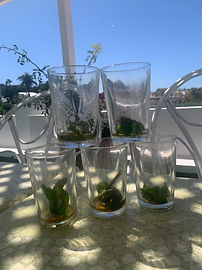University of Florida
Hospitality
Cianna and I are cutting onions for the Tagine

In our second week in Tangier, we went to a Moroccan cooking class. While there, we learned how to knead Moroccan bread and wash our hands properly. We then partnered up to make Tagine, with my partner being Cianna. When we finished making it, we took a twenty-minute break to let it simmer. During this time, our guides showed us the proper way to prepare and pour the tea. We got to hold and smell each of the ingredients of the mint tea, including the Saffron that is special to their tea. After preparing it, we learned how they pour the first cup back inside, and then have the man pour it up to a certain height for everyone else. Lastly, we learned that when the host is ready for the guest to leave, they pour their tea glass up to the top. When we finished, we then went back to check on our tagine, and ate together in a separate room.
This interaction taught me a key cultural concept towards Moroccan Hospitality. They approach hospitality with intentionality. The dedication to making the tea in front of their guest shows that the guests are valued above any other tasks the hosts may have. This is similar to the U.S., in that it’s common courtesy to offer coffee or maybe snacks on a charcuterie board to guests you invite to your house or a business meeting. Where I feel they differ is that Americans have a machine that does all the coffee preparation and will rarely put in the effort to make a charcuterie board, rather getting packaged snacks or a pre-made board. I feel the Moroccan method is more intimate, doing all the work by hand and making the tea as fresh as possible.

The Tea being prepared in front of us
Tea our group shared at a group lunch

This difference makes me wonder about all the other differences in our hospitality between the two countries. Having the male pour the tea versus the female in America is unique. Having the tea poured specifically higher to show respect and reduce sand represented differences in their environment, and pouring the glass to the top when the host is ready for the guest to leave feels comfortable from my experiences. In America, it’s known that the hosts have to drop subtle hints, and if the guests miss them, they have to tell them directly they need to leave, which leaves a sour taste in everyone's mouth. Contrast this with Morocco, where it’s clear when the host is ready for the guest to leave, and it gets rid of the guest's work